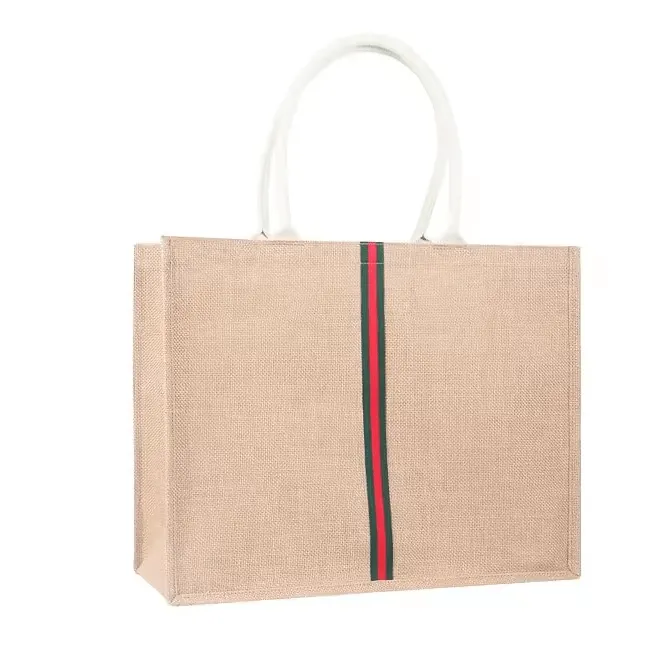Jute Bags vs. Plastic Bags: A Comparative Analysis of Sustainability and Practicality
2024-08-13
As the world grapples with the environmental crisis caused by plastic pollution, the search for sustainable alternatives has intensified. Among these alternatives, jute bags have emerged as a strong contender, offering a range of environmental and practical benefits. But how do jute bags compare to plastic bags in terms of sustainability and usability? In this blog, we'll take a closer look at the key differences between these two types of bags.
Environmental Impact
The environmental impact of a product is a critical factor in determining its sustainability. Here's how jute bags and plastic bags stack up:
1. Biodegradability:
- Jute Bags: Jute is a natural fiber that is completely biodegradable. When disposed of, jute bags break down into organic matter within a few months, leaving no toxic residues behind.
- Plastic Bags: Most plastic bags are made from non-biodegradable materials like polyethylene. These bags can take hundreds of years to decompose, contributing to long-term environmental pollution.
2. Production Process:
- Jute Bags: The production of jute bags involves minimal use of chemicals and energy. Jute plants require little to no pesticides or fertilizers, making jute cultivation an environmentally friendly process.
- Plastic Bags: The production of plastic bags is energy-intensive and relies on fossil fuels, which contribute to greenhouse gas emissions and climate change. Additionally, the extraction of raw materials for plastic bags often involves environmentally damaging practices.
3. Waste Management:
- Jute Bags: Due to their biodegradability, jute bags do not pose a significant waste management challenge. Even when discarded, they naturally decompose without harming the environment.
- Plastic Bags: Improper disposal of plastic bags leads to pollution in landfills, oceans, and other natural habitats. Plastic waste is particularly harmful to marine life, as animals can ingest or become entangled in plastic debris.

Durability and Reusability
When considering practicality, durability and reusability are important factors:
1. Durability:
- Jute Bags: Jute bags are known for their strength and durability. They can carry heavy loads without tearing, making them ideal for shopping, storage, and other everyday uses.
- Plastic Bags: While plastic bags are lightweight and convenient, they are prone to tearing and often have a limited lifespan. This lack of durability means they are frequently discarded after a single use.
2. Reusability:
- Jute Bags: Jute bags are designed for multiple uses. Their durability ensures that they can withstand repeated trips to the store, reducing the need for disposable alternatives.
- Plastic Bags: Although some plastic bags can be reused, they are generally less durable than jute bags and are more likely to be discarded after a few uses.
Cost Considerations
Cost is another factor that consumers often consider when choosing between jute and plastic bags:
1. Initial Cost:
- Jute Bags: Jute bags tend to have a higher upfront cost compared to plastic bags. However, their reusability and durability mean that they provide better long-term value.
- Plastic Bags: Plastic bags are cheap to produce and purchase, making them a cost-effective option for single-use applications. However, their environmental impact and limited lifespan can lead to hidden costs in terms of waste management and environmental damage.
2. Long-Term Value:
- Jute Bags: Over time, the cost of repeatedly purchasing plastic bags can add up. In contrast, a single jute bag can be used many times, offering better value for money in the long run.
- Plastic Bags: The low initial cost of plastic bags can be deceptive, as the need for frequent replacements and the environmental costs of disposal can outweigh the savings.
Aesthetic and Customization
In addition to practical considerations, the aesthetic appeal and customization options of jute and plastic bags play a role in consumer choice:
1. Aesthetic Appeal:
- Jute Bags: Jute bags have a natural, rustic charm that appeals to eco-conscious consumers. They can be designed in various styles, colors, and sizes, making them suitable for different occasions.
- Plastic Bags: Plastic bags are often plain and utilitarian in appearance. While they can be printed with logos and designs, they lack the natural texture and appeal of jute bags.
2. Customization:
- Jute Bags: Jute bags offer excellent customization opportunities. They can be printed with logos, slogans, or artwork, making them a popular choice for promotional items, gifts, and branded merchandise.
- Plastic Bags: While plastic bags can also be customized, their limited durability and environmental impact make them less desirable for long-term use.
Conclusion
When comparing jute bags and plastic bags, it becomes clear that jute bags offer significant advantages in terms of sustainability, durability, and aesthetic appeal. While plastic bags may be cheaper and more convenient for single-use purposes, their long-term environmental impact and lack of durability make them a less desirable option. For consumers looking to make a positive impact on the environment and enjoy a practical, stylish product, jute bags are the clear choice. By choosing jute bags, you're not only reducing waste but also supporting a sustainable and ethical industry that benefits both people and the planet.


